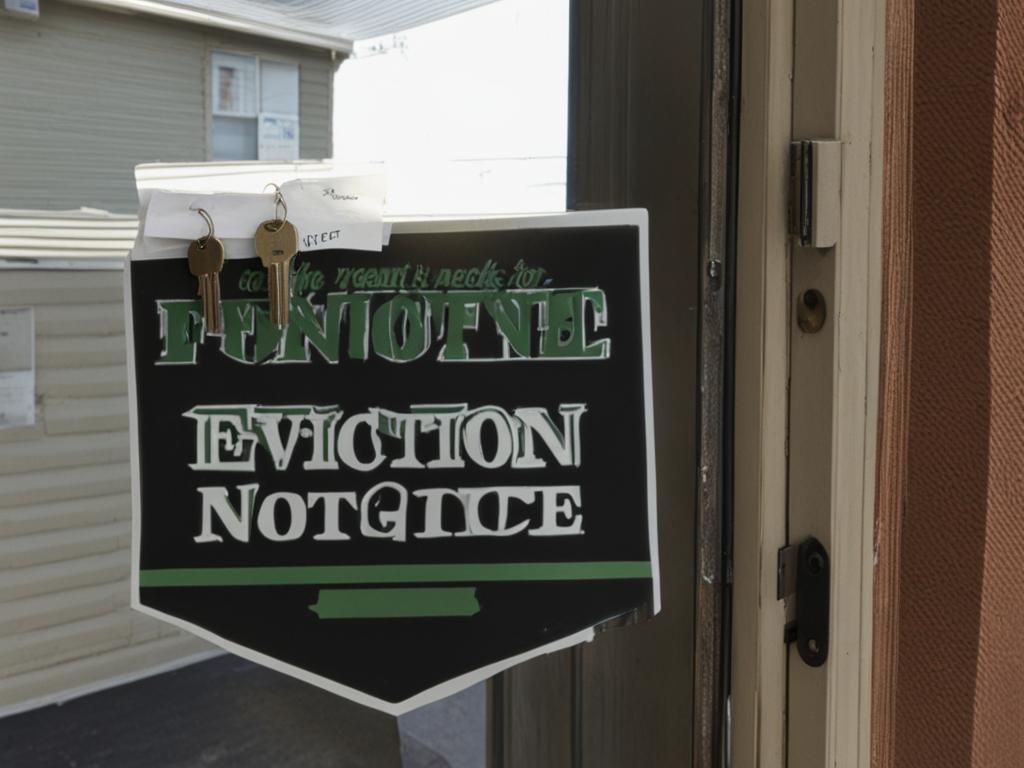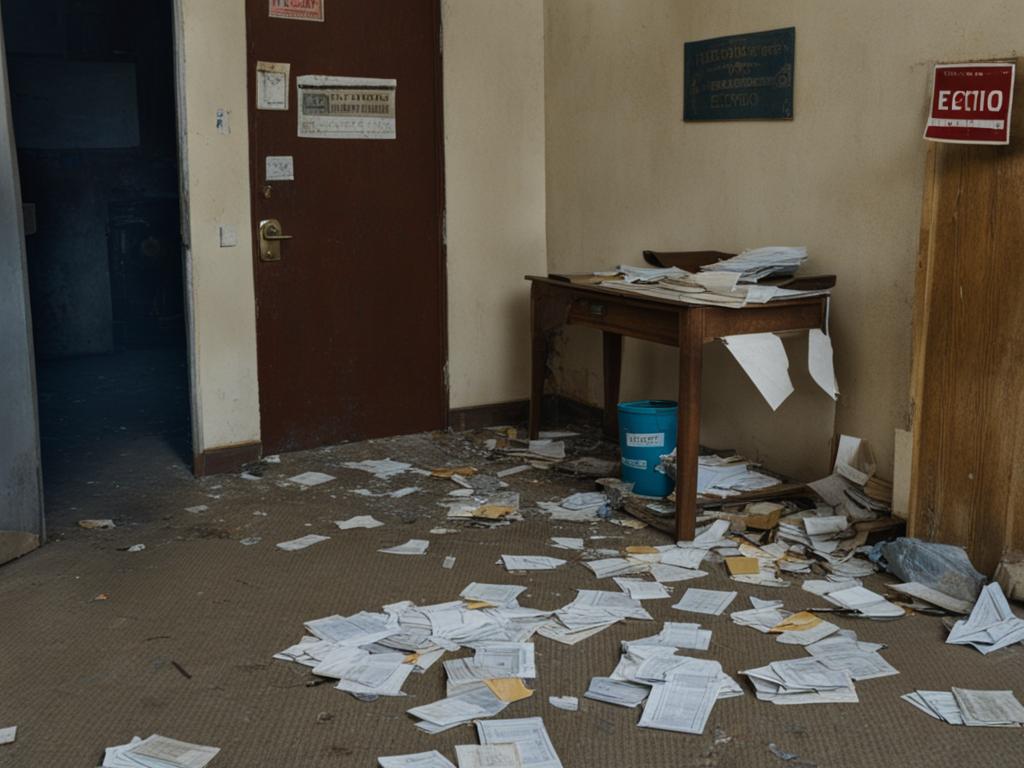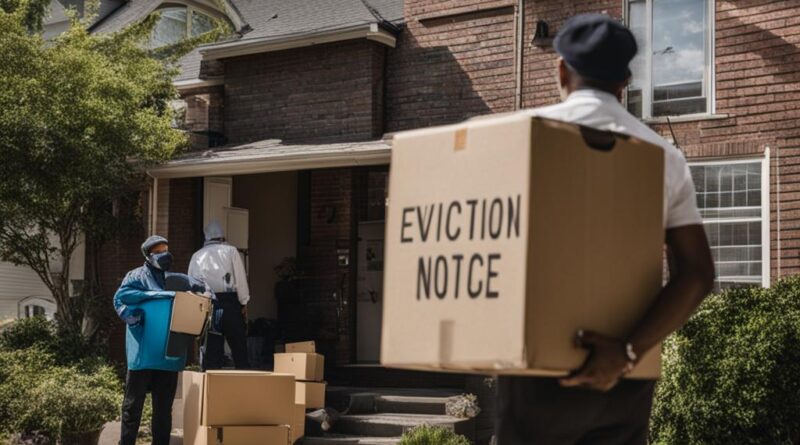Landlord Rights: Can They Charge for Eviction Fees?
Evicting a tenant can be a complex and expensive process for landlords. It often involves legal proceedings, court fees, and potential loss of rental income. One important question that arises is whether landlords have the right to charge for eviction fees. In this article, we will explore the legalities surrounding eviction fees and provide insights into the costs and financial implications for both landlords and tenants.
Eviction fees refer to the expenses incurred by landlords during the eviction process. These fees can include legal fees, court costs, lost rent, turnover costs, and property damages. Understanding the rights and obligations of both landlords and tenants is essential to navigate this process successfully.
Key Takeaways:
- Evicting a tenant can be a costly and time-consuming process for landlords.
- Reasons for eviction may include breaking lease terms, property damage, and failure to pay rent.
- The eviction process involves sending notices, filing court actions, attending hearings, and potentially obtaining court orders.
- Eviction costs can include legal fees, court expenses, lost rent, turnover costs, and property damages.
- Landlords have the right to charge eviction fees within the boundaries of applicable laws and lease agreements.
Reasons for Eviction
Evicting a tenant is often a last resort for landlords when all other options have been exhausted. There are several reasons why a landlord may decide to evict a tenant:
- Breaking Lease Terms: If a tenant violates the terms and conditions outlined in their lease agreement, such as subletting the property without permission or having unauthorized pets, the landlord may have grounds for eviction.
- Property Damage: When a tenant causes significant damage to the rental property beyond normal wear and tear, the landlord may need to pursue eviction to protect their investment and ensure the property remains in good condition for future tenants.
- Failure to Pay Rent: Non-payment of rent is one of the most common reasons for eviction. When a tenant consistently fails to pay rent on time or fails to pay it at all, it can place a financial strain on the landlord and may lead to eviction proceedings.
“According to TransUnion research, non-payment of rent is the most common reason for eviction, with 84% of landlords citing payment problems as their main concern.”
In cases where tenants engage in illegal activities, disturb neighbors, or violate local laws, landlords may also choose to pursue eviction to maintain the safety and well-being of the community.
Understanding the reasons for eviction is crucial for both landlords and tenants. By knowing the potential consequences, tenants can strive to meet their lease obligations and maintain a positive relationship with their landlord.
Consequences of Eviction
Eviction not only disrupts the lives of tenants but also comes with significant consequences for landlords. A successful eviction can be a time-consuming and expensive process, involving legal fees, court proceedings, and potential lost rental income. Landlords must carefully consider the reasons for eviction and weigh the financial and legal implications before pursuing it.
Here is a table summarizing the main reasons for eviction:
| Reason for Eviction | Description |
|---|---|
| Breaking Lease Terms | Tenant violates the terms and conditions of the lease agreement. |
| Property Damage | Tenant causes significant damage to the rental property. |
| Failure to Pay Rent | Tenant consistently fails to pay rent on time or fails to pay it at all. |
The Eviction Process
In the eviction process, several steps are involved to legally remove a tenant from a rental property. It starts with sending a notice to the tenant, filing a court action, and attending an eviction hearing. If the landlord is successful and wins the case, a court order is issued, known as a Warrant of Eviction or Writ of Restitution. At this point, the tenant is given the option to leave voluntarily or be removed by law enforcement.
During the eviction hearing, both the landlord and tenant have the opportunity to present their case and provide evidence. The judge will make a decision based on the presented information and applicable laws. If the landlord prevails, a court order will be issued, providing legal authority to remove the tenant.
In some cases, the tenant may choose to leave voluntarily after receiving the notice or attending the hearing. However, if the tenant refuses to leave, law enforcement may be involved to enforce the court order and physically remove the tenant from the property.
The lease agreement and local laws determine whether the tenant is responsible for paying court fees, attorney fees, unpaid rent, and damages. It is important for landlords to familiarize themselves with the legal requirements and obligations regarding the eviction process in their jurisdiction to ensure compliance and successful outcomes.
Notice to Tenant
Before initiating the eviction process, landlords are typically required to provide a notice to the tenant. This document serves as a formal notification that the tenant is in violation of the lease agreement and must address the issue within a specified timeframe or face eviction proceedings.
Court Action and Eviction Hearing
After serving the notice, landlords may proceed with filing a court action to initiate the eviction process. This involves submitting the necessary paperwork to the appropriate court and paying any required fees. Once the court action is filed, a date for an eviction hearing will be set.
At the eviction hearing, both the landlord and tenant have the opportunity to present their case and provide evidence supporting their claims. The judge will evaluate the presented information and make a decision based on the facts and applicable laws.
Court Order and Removing the Tenant
If the landlord is successful at the eviction hearing, a court order will be issued. This order provides legal authority for the landlord to remove the tenant from the property. The tenant may be given a specific period, typically a few days to a week, to voluntarily leave the premises. If the tenant fails to vacate the property within the specified timeframe, the landlord may request law enforcement assistance to physically remove the tenant.

It is essential for landlords to follow the proper legal procedures and adhere to local regulations when pursuing eviction. Failure to do so can result in delays, legal consequences, and potential liability.
Costs of Eviction
Evicting a tenant can have significant financial implications for landlords. Let’s take a closer look at the various costs associated with the eviction process:
1. Legal Fees
When evicting a tenant, landlords often rely on the expertise of attorneys to handle the legal aspects. These legal professionals charge fees for their services, which can vary depending on factors such as the complexity of the case and the attorney’s experience.
2. Court Costs
Filing an eviction claim in court involves certain expenses, such as filing fees. These costs contribute to the overall financial burden of the eviction process. In cases where the tenant disputes the eviction with legal representation, additional costs may arise from motions, discovery, and potential jury trials.
3. Lost Rent
During the eviction proceedings, landlords often experience a loss of rental income. Even if the court orders the tenant to leave, there may still be unpaid rent owed to the landlord. The time spent on legal proceedings and property turnover can result in a prolonged vacancy, further impacting the rental income for landlords.
4. Property Turnover Costs
Preparing the property for rent again after an eviction involves certain expenses. These may include maintenance fees to address any damages caused by the tenant, advertising expenses to attract new tenants, and property management fees to ensure a smooth transition and occupancy.
5. Property Damages
Tenants being evicted may cause damages to the rental property, adding to the financial burden for landlords. This can include repair or cleaning fees to restore the property’s condition before it can be re-rented. In some cases, landlords may also incur costs for the removal and storage of abandoned possessions or the disposal of hazardous materials.
To better understand the costs of eviction, refer to the table below:
| Cost Category | Details |
|---|---|
| Legal Fees | Attorney fees for eviction process representation |
| Court Costs | Filing fees and potential legal representation expenses |
| Lost Rent | Income loss during eviction proceedings |
| Property Turnover Costs | Maintenance, advertising, and property management fees |
| Property Damages | Repair, cleaning, removal, and disposal expenses |
Legal Fees
When going through the eviction process, landlords may need to hire an attorney to navigate the legal complexities. The cost of hiring an attorney for eviction proceedings can vary depending on factors such as the complexity of the case and the attorney’s experience.
Attorney fees for eviction can range from a few hundred dollars to several thousand dollars. Landlords can expect to pay for the attorney’s time spent on tasks such as reviewing the case, filing the necessary paperwork, representing them in court, and providing legal advice throughout the process.
In addition to attorney fees, court expenses also contribute to the overall cost of eviction. Landlords are required to pay filing fees when initiating the eviction process in court. These fees can vary depending on the jurisdiction, but they typically range from $100 to $500.
It’s important for landlords to budget for legal fees and court expenses when considering the cost of eviction. The total cost will depend on factors such as the complexity of the case, the need for additional legal services, and any potential disputes or delays that may arise during the process.

Sample Attorney Fees for Eviction
| Attorney | Experience | Cost Range |
|---|---|---|
| Smith & Johnson Law Firm | 5+ years | $500 – $1,500 |
| Miller & Davis Legal Services | 10+ years | $1,500 – $3,000 |
| Clarkson & Associates | 15+ years | $3,000 – $5,000 |
Please note that these are approximate cost ranges and may vary depending on specific circumstances and geographic location. It’s recommended to consult with multiple attorneys to compare their fees and services before making a decision.
Court Costs
Evicting a tenant involves legal proceedings that incur court costs for landlords. These court costs primarily come in the form of filing fees, which are required to initiate the eviction process in court. Filing fees vary depending on the jurisdiction but typically range from $100 to $500.
However, court costs can increase if the eviction is disputed by the tenant with the help of legal representation. In such cases, additional motions, discovery, and potential jury trials may be required, leading to higher legal costs.
Disputed evictions can significantly escalate court costs for landlords, as they often require extensive legal proceedings and court appearances. It is crucial for landlords to carefully consider the potential financial implications before proceeding with a disputed eviction.
To give you a better idea of the court costs associated with eviction, here is an example of the fees involved:
| Expense | Cost |
|---|---|
| Filing Fee | $200 |
| Motion for Discovery | $100 |
| Jury Trial | $500 |
| Total Court Costs | $800 |
Note: The above figures are for illustrative purposes only and may not reflect the actual court costs in your jurisdiction. It is essential to consult with a local attorney or legal professional to determine the precise costs applicable in your area.
Lost Rent
During the eviction process, landlords often experience a significant loss of rental income. Even if the court orders the tenant to leave, there may still be unpaid rent owed to the landlord. This unpaid rental debt can add to the financial burden incurred during the eviction process.
The time spent on legal proceedings and property turnover can result in a prolonged vacancy, further impacting the rental income for landlords. As they navigate through the eviction process, landlords may find themselves dealing with lost rent and the challenges of finding new tenants to fill the vacancy left by the evicted tenant.
The Impact of Lost Rent
The lost rent during eviction can have a profound effect on landlords’ finances. The inability to collect rental income during this period can disrupt cash flow and hinder the ability to cover mortgage payments, property taxes, or other expenses associated with owning and maintaining the rental property.
Furthermore, the longer the eviction process takes, the more rental income is lost, multiplying the financial strain on landlords. This loss of rental income can be particularly burdensome for smaller landlords or those who rely heavily on rental income for their livelihood.
Strategies to Minimize Lost Rent
To minimize the impact of lost rent during an eviction, landlords should consider implementing the following strategies:
- Thoroughly screen potential tenants to reduce the likelihood of eviction
- Enforce prompt rental payments and address any rent payment issues promptly
- Consider requiring renter’s insurance to protect against property damages and unpaid rent
- Actively market the property to minimize vacancy periods after an eviction
- Keep open lines of communication with tenants to address issues before they escalate
By adopting proactive measures, landlords can mitigate the risk of extended vacancies and minimize the financial impact of lost rent during the eviction process.

Property Turnover Costs
Evicting a tenant can be a complex process, and it’s essential to consider the costs involved in preparing the property for rent again. Property turnover costs can include various expenses that landlords need to account for, such as:
- Prorated mortgage payments and HOA dues that the landlord becomes responsible for during the vacancy period.
- Advertising expenses to attract new tenants and market the rental property effectively.
- Property management fees for professional services that assist with tenant screening, lease agreements, and ongoing maintenance.
These costs can significantly impact a landlord’s finances, especially when combined with the legal and court fees associated with the eviction process.
In addition to the financial burden, property turnover also requires time and effort to get the rental property ready for occupancy once again. This may involve tasks such as cleaning, repairs, and potentially addressing any damages caused by the previous tenant.
Property Turnover Costs Overview
| Expense | Description |
|---|---|
| Prorated Mortgage Payments and HOA Dues | The landlord may need to cover the expenses during the vacancy period. |
| Advertising Expenses | Costs associated with marketing the rental property to attract potential tenants. |
| Property Management Fees | Costs for professional property management services such as tenant screening, lease management, and ongoing maintenance. |
| Maintenance and Repair Costs | Expenses incurred to address any damages or necessary repairs before renting the property again. |
It is crucial for landlords to take property turnover costs into account when budgeting and planning their rental property management strategy. By being prepared for these expenses, landlords can navigate evictions with a better understanding of the financial implications and make informed decisions to minimize their impact.

Property Damages
Tenants being evicted can sometimes leave behind property damages, which can add to the overall costs of the eviction process. Landlords may find themselves in need of professional cleaning services to restore the rental property to its original condition before it can be re-rented.
Depending on the state laws, landlords may also be required to remove and store any personal possessions left behind by the evicted tenant. This process can involve additional costs, including storage fees and potentially hiring a moving company.
In cases where the tenant abandons the property, landlords may face the challenge of disposing of any abandoned belongings. This can include electronics, large items, and hazardous materials, all of which require a proper and safe disposal method. Disposing of these items can incur additional costs that landlords must bear.
Considerations for Landlords:
- Document the condition of the rental property before and after the tenant’s occupancy to support any claims for damages.
- Understand the specific laws and regulations in your state regarding property damages during eviction and the removal of personal possessions.
- Consider including clauses in the lease agreement that clearly outline the tenant’s responsibility for any damages caused during their tenancy.
- Factor in potential cleaning fees and disposal costs when calculating the overall expenses and potential losses involved in the eviction process.
| Expenses | Costs |
|---|---|
| Cleaning Services | $250 – $500 |
| Storage Fees | $50 – $150 per month |
| Disposal Costs | $100 – $300 |
Remember:
Properly documenting and addressing property damages during eviction is essential to protect your investment and minimize financial losses.

Financial Damages
Winning a financial judgment against a tenant may seem like a victory for landlords, but recouping the losses can be a daunting task. According to the American Collectors Association, the success rate for collecting average debt is only 17%. This means that landlords often face challenges in collecting the financial damages owed to them, even with a court judgment in their favor.
Debt collection can be a time-consuming and frustrating process. Landlords may have to navigate through legal procedures, deal with nonresponsive tenants, and consider the costs involved in hiring debt collection agencies or pursuing legal action. The intricacies of the debt collection process can further delay the recovery of financial damages, leaving landlords in a vulnerable position.
Furthermore, even if landlords are successful in obtaining a court judgment, it does not guarantee immediate payment. Tenants may not have the financial means or willingness to repay the debt promptly. This delay in receiving payment can have a significant impact on landlords, especially if they rely on rental income for their financial stability.
“Collecting debts can be a challenging and frustrating process for landlords, affecting their ability to recoup financial losses.”
To navigate the complexities of debt collection and increase the chances of recouping losses, landlords can take proactive steps. These may include:
- Assessing the financial stability of prospective tenants through thorough screening processes
- Enforcing strict rent collection policies and actively pursuing delinquent payments
- Implementing clear lease agreements with provisions for debt collection
- Engaging professional debt collection agencies with expertise in the rental industry
By being vigilant and proactive, landlords can mitigate the risks associated with financial damages and improve their chances of recovering the money owed to them.

Key Takeaways
- Winning a financial judgment against a tenant does not guarantee the prompt collection of debts.
- Debt collection can be a challenging and time-consuming process for landlords.
- Taking proactive steps, such as thorough tenant screening and engaging debt collection agencies, can increase the chances of recouping losses.
- Landlords should consider implementing clear lease agreements with provisions for debt collection.
- Being prepared and proactive can help landlords mitigate the financial risks associated with tenant debts.
Conclusion
Concluding the discussion on evicting tenants, it is evident that this process can impose significant financial burdens on landlords. To mitigate these costs, it is crucial for landlords to adopt preventative measures that aim at preventing evictions altogether. By implementing strong rental policies, conducting thorough tenant screenings, and maintaining clear lease agreements, landlords can minimize the likelihood of facing evictions and the associated expenses.
Strong rental policies establish clear expectations and guidelines for tenants, encouraging them to fulfill their obligations and adhere to the terms of the lease. This proactive approach can help to prevent conflicts and disputes that may lead to eviction proceedings.
Additionally, conducting comprehensive tenant background checks and verifying applicants’ rental history, employment, and financial stability can provide landlords with valuable insight into potential tenants’ reliability and ability to meet their rental obligations. This screening process enables landlords to select tenants with a lower risk of defaulting on rent payments or violating lease terms.
Furthermore, having clear and well-drafted lease agreements helps to avoid misunderstandings between landlords and tenants. These agreements should include key terms regarding rent payment, property maintenance, and tenant responsibilities, leaving little room for ambiguity. A clearly defined lease agreement can serve as a reference point and provide legal protection for landlords in case of a dispute.
In conclusion, by implementing these preventative measures, landlords can minimize the occurrence of evictions and the financial strain associated with the process. Taking a proactive approach to tenant selection and maintaining transparent communication with tenants can go a long way in preserving the landlord-tenant relationship and avoiding costly legal procedures.
FAQ
Can a landlord charge for eviction fees?
Yes, landlords can potentially charge for eviction fees depending on the lease agreement and local laws.
What are the reasons for eviction?
Landlords may evict tenants for breaking lease terms, causing property damage, or failing to pay rent.
What is involved in the eviction process?
The eviction process typically includes sending a notice to the tenant, filing a court action, and attending an eviction hearing. If the landlord wins, a court order is issued, and the tenant may be removed by law enforcement.
What are the costs associated with eviction?
Eviction costs can include legal fees, court costs, lost rental income, property turnover costs, and property damages.
Can landlords charge legal fees for eviction?
Yes, landlords can charge legal fees for eviction, which can vary depending on the complexity of the case and the attorney’s experience.
What are the court costs for eviction?
Court costs for eviction include filing fees and potential additional costs if the eviction is disputed and requires further legal proceedings.
How does eviction result in lost rent?
The eviction process can lead to a prolonged vacancy, resulting in a loss of rental income for landlords.
What are property turnover costs?
Property turnover costs include prorated mortgage payments, advertising expenses, property management fees, and maintenance services to prepare the rental property for occupancy again.
Can landlords charge for property damages during eviction?
Landlords may incur costs for cleaning services, removal of personal possessions, and disposal expenses if the tenant has caused damages during the eviction process.
How difficult is it to recoup financial damages from a tenant?
Collecting financial debts from tenants can be challenging, with a low success rate of only 17% for collecting average debt.
How can landlords prevent evictions?
Landlords can take preventative measures by implementing strong rental policies, conducting thorough tenant screenings, and having clear lease agreements in place.

